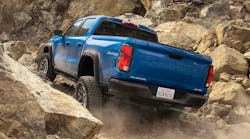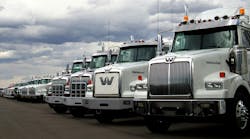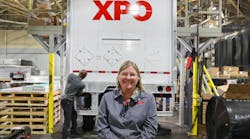The most notable improvement in the recycling industry over the past 15 years has been in how recyclables are processed. Where once drivers had to sort materials curbside into as many as seven separate compartments on a truck, the newer two-compartment trucks have freed them up to collect more recyclables from more homes in a shorter period of time.
With efficiency and productivity of drivers increased, recycling companies like Republic Services based in Ft. Lauderdale, FL, can concentrate on some of the other challenges of running a business that relies so heavily on its truck fleet.
Republic Services operates in 22 states throughout the country. Numerous acquisitions of smaller companies over the years have helped make it the third-largest company in the solid waste industry, according to Will Flower, vp-communications.
“In this industry we have to be able to service a variety of markets from extremely rural to major metropolitan areas. Matching the right truck to the application is always important. We need to utilize our equipment the most effectively to remain competitive and exceed our customers' expectations,” Flower reports.
Jerry Wickett, vp of purchasing and fleet maintenance, notes there are a total of 5,500 trucks operating nationwide in the company fleet. Recycle trucks account for 500 of those vehicles, 2,000 are rear loaders, 1,000 front loaders and 1,400 roll-offs. All equipment is company owned and remains in the fleet for its entire lifecycle.
“Being an acquisition-growth company,” Wickett explains, “we have just about every make truck in our fleet. Our primary focus when spec'ng new recycling equipment, however, is on Mack chassis and Heil bodies, as well as some International chassis.”
Truck routes vary widely depending on type of service being provided and the community being served. “Typically the routes are all one-man operations, so we spec the truck chassis with dual steering-the conventional driving position on the left side, with the addition of a working position on the right to get the driver nearer to the curb for pickups,” Wickett advises.
“The side-loaders bodies have two bins that can be raised and dumped into the truck's hopper, which is split into two compartments horizontally so that newspaper and cardboard ends up on the bottom half and co-mingled products (glass, aluminum, and plastic) end up on the top. Recyclables can be compacted to allow for 5-6 tons of payload.”
Will Flower adds that since efficiency is what drives his business, it's their goal to spec vehicles to allow drivers to make as many stops/pickups as possible. For example, the trucks are spec'd with a low-entry height that makes it easier and safer for drivers to get in and out of the cab. They also have Allison automatic transmissions and on the Macks, a Telma brake retarder is spec'd to enhance brake lining life.
Of vital importance to the whole operation, according to Jerry Wickett, are the mechanics that keep the vehicles going each morning. “Mechanics make up somewhere between 900-1,000 of our total 12,900 workforce. Finding qualified technicians is always a challenge. We compete with truck dealers and over-the-road fleets for their expertise.”
Maintenance of the vehicles is performed in-house and, according to Wickett, the company has an extensive maintenance program in place, including use of retreads to extend tire life. “We also use fluid analysis services to check the health of our engines, transmissions and hydraulic systems on a regular basis,” he summarizes.


